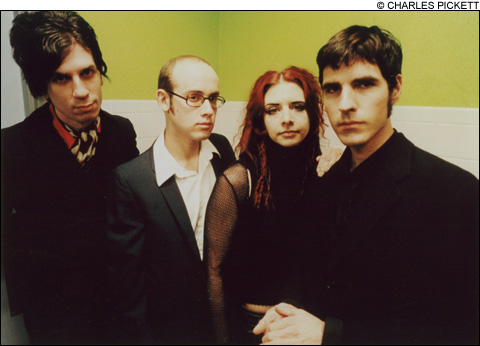
PERPETUAL CUSP “We were always tripping over ourselves to be clever and have something for everyone,” says Todd Demma (right). |
It's a fun bit of Boston rock trivia that on September 23, 1991, homegrown post-punk band Bullet LaVolta played WFNX's fifth-birthday show at Axis with two relative unknowns: the Smashing Pumpkins and, on the eve of Nevermind's release, Nirvana. So what's the post-millennial version, the date when a band of ours were swallowed up by a national hype machine and left without proper accolades?
Perhaps May 19, 2001, at T.T. the Bear's Place. Scene veterans Mistle Thrush, perpetually on the cusp of a national breakthrough, had spent eight years garnering a loyal fan base while perplexing the rest of the city with a sound and style impossible to define in the easy-to-quantify mid to late '90s. On this night, they headlined a gig with two openers who would pave a new course for the next decade of dirty rock: Black Rebel Motorcycle Club and the Strokes, who'd release Is This It two months later.
"The week before the show, they were both blowing the fuck up," says Mistle Thrush drummer Todd Demma from Los Angeles. "So we get to T.T.'s for soundcheck, and there's already a line around the block. I wish I'd had the foresight to flip the order of the bands. Sure enough, the two of them play and two-thirds of the room clears out."
It's one of the many footnotes in the history of this female-fronted alt-rock band, who'll re-form this Saturday — in their first show in nearly eight years — for the second annual Soozapalooza at the Middle East downstairs. Demma, a West Coast musician and tour manager (Frank Black, Cake), will be joined by vocalist Valerie Forgione (now executive vice-president of Newbury Comics), guitarist Scott Patalano of Gene Dante & the Future Starlets, and bassist Matt Klain.
Two years after forming, Mistle Thrush used the payout from a semifinals appearance in the 1995 Rumble to record their debut, Silt, at Fort Apache studios. "Back in '95, there was this resurgence of female-fronted bands," Demma explains, "and lots of bands were lumped together both stylistically and musically." Adds Forgione: "People were doing weirder things, coming out of this refined grunge era."
Latching onto that weirdness while sharing stages with Garbage and Sonic Youth and charting on CMJ, the band found their dark aural rainbow to be both a blessing and a curse. Writers pegged them as "goth," and the elements of shoegaze, textured æthereal dreampop, and abrasive alt-rock dizzied the mainstream upon the release of their second album, 1997's Super Refraction, on the Elektra Records–bankrolled "indie" label Egg.
"We thought it was a great thing, an asset. 'We can't be categorized!' " says Demma. "But, really, what a detriment that is, marketing-wise. We were always tripping over ourselves to be clever and have something for everyone." Forgione agrees: "There's a reason pop music has such wide appeal. A lack of easy definition was one of our biggest hurdles."